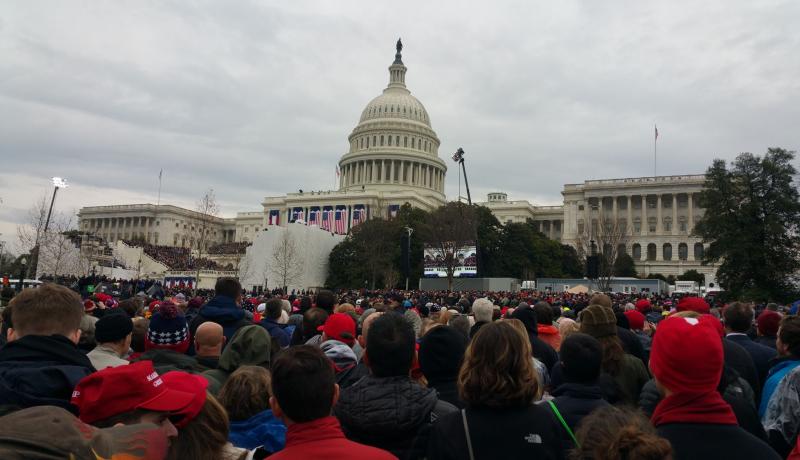Above and Beyond

Capital Ideas
In the dawning days of 2017, students Phil Cranwell ’17, Will Ospina ’19, and Richard Pastrana ’16, ’17 M.S., journeyed to Washington, D.C. to witness the peaceful transition of power.
But seeing Donald Trump get sworn in as the 45th President of the United States wasn’t the real reason behind the trio’s Washington trip; it was just the finale to a rigorous two-week academic course load consisting of lectures, panel discussions, workshops, daily writings, nightly readings, and weekly essays—as well as regular bouts of lively, yet respectful, political discourse. Cranwell, Ospina, and Pastrana represented NJCU at the Washington Center’s Presidential Seminar, an annual event during which some of the finest college students from around the country converge on the nation’s capital
Each of the NJCU participants have demonstrated their political acumen on the University’s campus. Cranwell, who currently serves as a captain in the North Hudson Fire Department, is a Political Science major with plans to attendlaw school.
Ospina, who plans to become a teacher, is a dual major in Political Science and History. “I’m a big fan of both,” he says. “What I enjoy about both majors is that they piggyback off of each other. Whatever I learn in my history classes I can apply to my political science classes and whatever I learn in my political science classes I can apply to my history classes.”
Pastrana dual majored in Criminal Justice and Computer Science. After he graduated, he began pursuing his master’s degree in Criminal Science. Though his academic background is less politics-centered than his fellow seminar participants, he is no less politically focused; a member of the NJCU student government for four years, he served his final year as president of the senior class.
“This was the first year the Washington Center accepted criminal justice majors,” Pastrana notes. “So, I got lucky.”
Cranwell and Ospina knew each other before the seminar, working as a team in a Political Science course taught by Professor Fran Moran. Titled “2016,” the class focused on analyzing the 2016 election as it spooled out toward Election Day. Using forecasting models, Cranwell and Ospina—unlike most every pollster in the U.S.—almost perfectly predicted Trump’s upset victory on a state-by-state basis.
“We looked at everything,” remembers Cranwell. “All the numbers.”
Ospina finishes Cranwell’s thought: “And we were so accurate it was scary. We were only off by a state or two, but what we predicted is pretty much what happened.”
More than 300 students attended the seminar; all of them were gregarious classroom participants. “Sometimes, in a typical college classroom, a professor would ask a question and the students would be quiet,” Ospina explains. “But at the Washington Seminar, hands flew up for everything. Everybody had something to say.”
Each day, guest speakers initiated a new topic of discussion: race, finances, immigration, health care. Each speaker’s personality provided a new energy dynamic—from the relaxed analytical perspective of Steve Scully of CSPAN to the bolder, provocative rhetoric of author and radio host Michael Eric Dyson.
Each afternoon, the students were broken into small groups to take part in site visits around the city. In addition to museums, Cranwell, Ospina, and Pastrana visited various think tanks, the Capitol, and the broadcasting studios of C-SPAN.
“It was a real education,” says Cranwell, “At the Climate Institute, for example, they talked about building a solar infrastructure for this country. They explained how they were tailoring their arguments for the new administration, which is more focused on infrastructure than the environment.”
The trio also got a few unexpected encounters with elected officials. “When we saw [New Jersey Senator] Bob Menendez, we thought he might have a security detail but he didn’t,” Ospina says. “So, we stopped him. Most of these guys are just happy to meet someone who is happy to meet them.”
And then came the Inauguration. A festive, if unsurprisingly partisan affair. “The crowd booed and yelled, ‘Lock her up’ whenever the camera pointed in Hillary’s direction,” Pastrana says. “People have the right to disagree, but I found it disrespectful.”
“I felt a little bad about it,” Cranwell adds, “until I saw a clip from 2009 when the crowd booed George W. Bush. So, I guess that’s just a thing that happens.”
In the end, the whirlwind trip to Washington provided levels of insight that far surpassed what can be gleaned from any news broadcast or magazine story. “This was an incredible experience for a political junkie like me,” Ospina says, wearing a wide smile. “It was like Hollywood to a movie fan.” NJCU